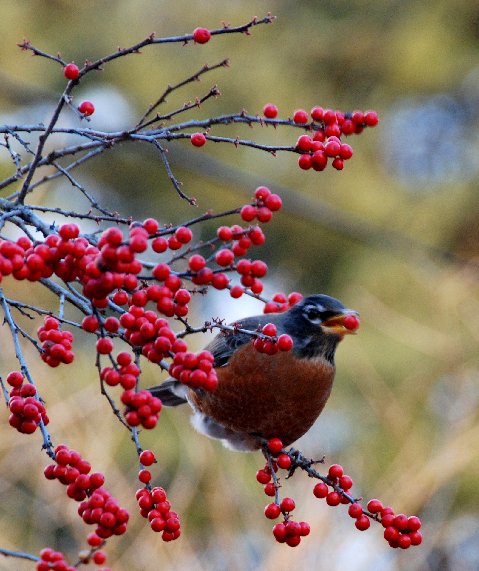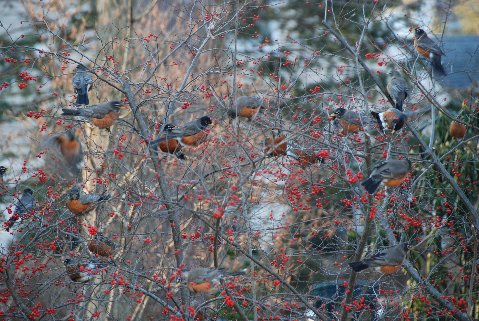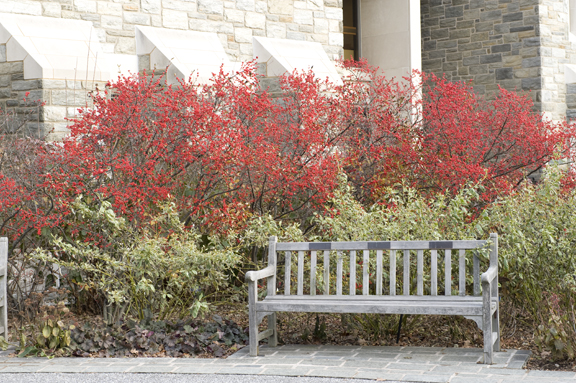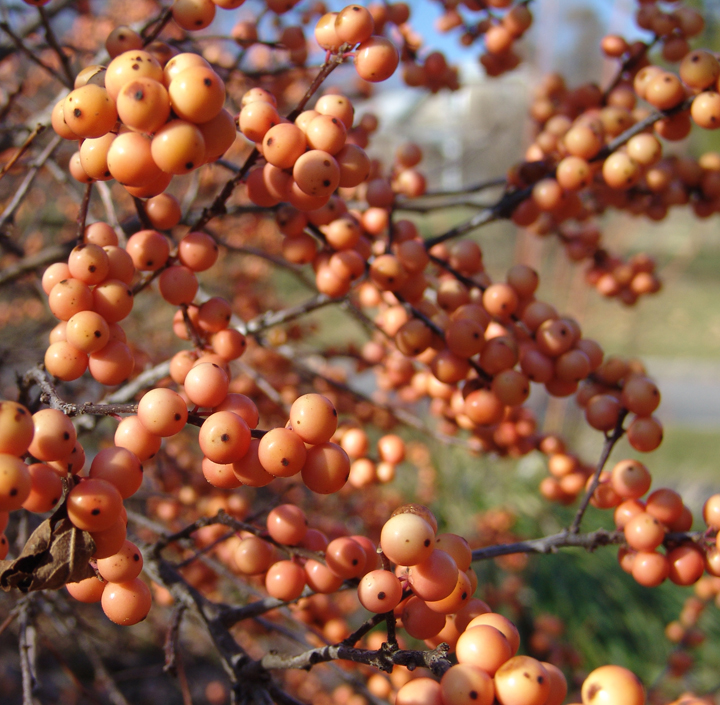Has the flock visited your garden?
The other day I was speaking with a member of the Scott Arboretum about how she had the pleasure of witnessing a flock of robins descend on her planting of winterberry, Ilex verticillata, and remove every berry in sight within 45 minutes. You can imagine my delight when crossing campus several days later I witnessed a flock, maybe the same one, foraging on a large planting of Ilex ‘Sparkleberry’ outside of the McCabe Library.
This planting of five 13-year-old winterberry shrubs are normally rather striking in the winter landscape with their abundance of brilliant-red berries. Upon my return from running my errand I found the bushes stripped of every berry except those that had begun to spoil.
Winterberry is a favorite of at least 12 bird species including Northern Mockingbird, Gray Catbird, Brown Thrasher, and Hermit Thrush. In addition, they serve as great nesting places for the Cedar Waxwings and Red-winged Blackbirds.

Ilex 'Sparkleberry' in front of McCabe Library after robins have picked the plant clean. photo credit: R. Robert
With wildlife benefits like these, winterberry is an ideal plant for the sustainable gardener. It provides wildlife habit, food, and not surprising, it is a native plant. In addition to these characteristics this deciduous holly adds great winter interest to your garden and comes in a great variety of cultivars.
At the Arboretum, we have over 30 different cultivars planted throughout campus. Our favorites include: ‘Winter Red’, ‘Red Spirit’, ‘Maryland Beauty’, and ‘Sparkleberry’. If you’re not interested in red, try Ilex verticillata ‘Winter Gold’ which has orange berries.
In order to have those striking berries and food for wildlife be sure to plant a male pollinator for these dioecious hollies. ‘Southern Gentlemen’ will pollinate ‘Winter Red’ and ‘Winter Gold’, ‘Jim Dandy’ for ‘Red Sprite’, ‘Raritan Chief’ for ‘Maryland Beauty’, and ‘Apollo’ for ‘Sparkleberry’.
In my small yard, I have planted ‘Winter Red’, ‘Winter Gold’, and one ‘Southern Gentlemen’ to take care of all the ladies. The flock has not found my small plantings yet but I will keep an eye out. Check these links to learn more about planting for birds and creating a backyard wildlife habitat.









Jan Semler
Posted at 12:58h, 05 FebruaryI’ve also enjoyed this phenomenon, which seems to happen every winter here at the Service Building, where the mature holly next to the loading dock is visited by a flock of robins, who devour the fruit in one great gorging event. They haven’t visited yet this year, but I’m looking forward to seeing them.
Drew Peogn
Posted at 13:40h, 05 FebruarySome time ago, inspired by the winter landscape of the Scott Arboretum, and my desire to foster wildlife in the rapidly diminishing fields and forests of the Philadelphia suburbs, I planted a few Ilex verticillata ???inter Red’ against a background of mixed evergreen shrubs.
After a few years of less than spectacular displays, autumn arrived and the leaves slowly fell away to reveal the hundreds of bright red berries I’d been hoping for. I was already imagining the ice-glazed fruits hanging from the silver branches, dusted with new fallen snow and graced by the occasional appearance of a few grateful birds sharing nature’s bounty in the depths of winter.
Less than a week later, still early in the fall, I was on the phone in the second floor office of my home, gazing out a window, and admiring the planting that had finally fulfilled its promise. Suddenly a flock of a few dozen robins mobbed the shrubs and, to my horror, stripped the plants in less than ten minutes!
I finished my phone call and walked outside to survey the damage, finding only a single remaining berry quivering on its stem. And as I watched tearfully, that one too fell from the branch.
Always the optimist I acquired a half-dozen I. v. ‘Red Sprite’, with the slight hope that if I achieve a critical mass of fruit the robins might just leave me enough for a passable winter display.
I’ve even thought about discreetly peppering the neighborhood with winterberry seedlings so that eventually the flocks’ attention might be diverted a bit from my yard! Of course in another ten years or so the Ilex-fed robins’ droppings might achieve the same thing.
So forgive me if my answer to, “Has the flock visited your garden?”, isn’t as joyful as you might hope.
Be careful what you wish for.
Jan Semler
Posted at 15:49h, 05 Februaryfollowing up on my message from this morning…The robins are here! Not in as great a number as I’ve seen in past years, but they are here and enjoying the holly berries on the tall shrub outside my window. Do the robins migrate through this area, or are these local birds who cycle through various feeding areas?
Andrew Bunting
Posted at 15:58h, 05 FebruaryI am pretty sure the American Robin stays in this area all season long. I don’t know if they are necessarily the same ones in the summer, but it is a species of bird that is around throughout the year.
James Laubach
Posted at 14:40h, 06 FebruaryOur winterberries in northwestern Chester County were attacked by seven bluebirds and quickly cleaned off. They came back several times to get stray berries missed before.
Liz Haegele
Posted at 11:57h, 09 FebruaryIf any of you are interested in learning more about how native plants provide food for insects and birds, please join us for our upcoming lecture with Doug Tallamy titled Bringing Nature Home on Thursday, February 12, 2009 at 7:30pm in the Science Center 101 here at Swarthmore!
Paula Wallach
Posted at 16:32h, 08 JanuaryWhat a timely article!! We were surprised to see a huge flock of plump robins descend on our property yesterday. We have no ilex verticillata, but our neighbor has two large evergreen hollies loaded with berries, and the birds are all over them. Unfortunately many birds have banged into our windows,in fact more than I ever remember.
Becky Robert
Posted at 10:33h, 09 JanuaryHey Paula, Last year the flock found my ‘Winter Gold’ in the front yard but never touched my ‘Sparkleberry’ in the backyard. I haven’t seen the flock yet this year. Sounds like they might be on the way…:)
Becky Robert
paula wallach
Posted at 12:30h, 09 JanuaryHI Becky!
I admire and covet your ‘ Winter Golds’ every time I turn from Governor’s Drive onto 320!!! The color is so vibrant! I checked this morning and the berries are still hanging on! I am definitely going to plant some in the spring. I heard that the robins were crashing into our windows because they were “drunk” from their berry orgy!
betzie
Posted at 21:53h, 30 AugustI want to know if it would be sucessfull to plant a big grouping of ” Sparkleberry ” Ilex verticilata in an area that gets really wet… standing water… that does not drain off though a drainage ditch was dug. Planting would be close proximity to willow trees about 20′ away…full to part sun…?